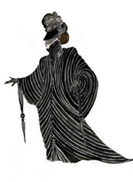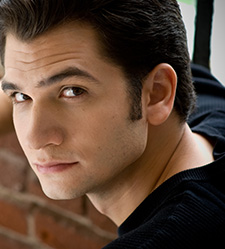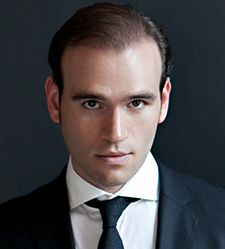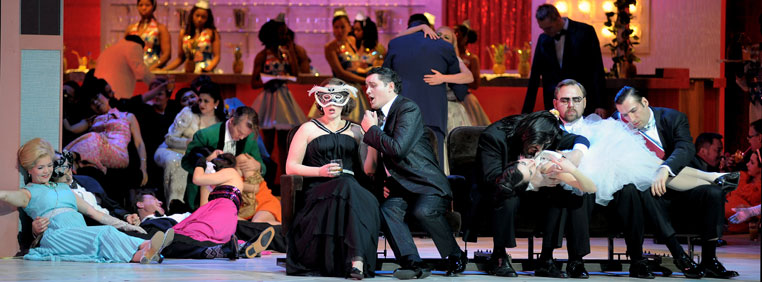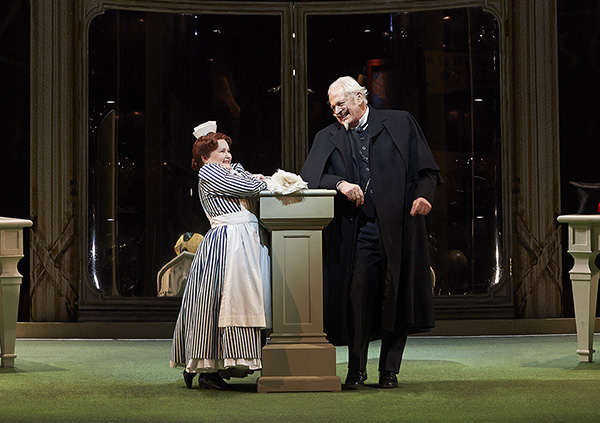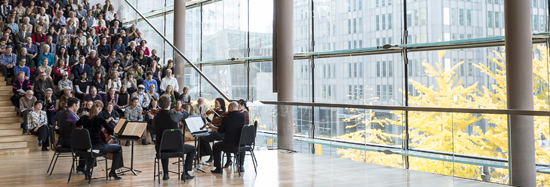A singer deemed “Superb” by the Los Angeles Times, praised by Opera Canada for her “vivacious stage presence” and “soprano that charms and brightens a room”, the grateful recipient of Opera Hamilton’s Sheila Zack Scholarship for Emerging Artists, Mireille Asselin is a young singer at the onset of an exciting career.

Mireille Asselin with Warren Christie: Magic Flute Diaries
Having taken the title role in Handel’s Theodora with the Bach Collegium San Diego under the baton of Maestro Richard Egarr; Susanna (Le Nozze di Figaro) and Rossignol (Stravinsky’s Le Rossignol) with Yale Opera; and Adele (Die Fledermaus) with Opera Hamilton, last year Opera Atelier introduced Asselin to Toronto audiences as Galatea (Acis and Galatea) and Servilia (La Clemenza di Tito). Asselin made her feature film debut as Pamina in Sullivan Entertainment’s Magic Flute Diaries, released in 2007 when she was only twenty-one. In April 2011 she made her Carnegie Hall debut singing Vaughan Williams’ Dona Nobis Pacem with the Yale Symphony, and returned to Carnegie this January in recital with the Song Continues series.
This year Asselin will sing Beethoven’s 9th Symphony with the Hamilton Philharmonic Orchestra; Proserpine & La déesse Flore with Boston Early Music in their double bill of Charpentier’s La Descente d’Orfée aux enfers & La Couronne de Fleurs; Popera with Opera Hamilton; and Phénice & Lucinde in Lully’s Armide at Glimmerglass this summer.
I ask Asselin ten questions: five about herself and five about her upcoming work with the COC ensemble in Semele.
1) Which of your parents do you resemble (what’s your nationality / ethnic background)?
I would say that I most resemble my father. Ever since I was born, people would remark on our identical wavy and unruly dark hair, dark eyes and round french face. He’s french canadian through and through, with the first of the Asselin family coming over to New France in the mid-17th century. However, my maternal family would probably make a case for some of the features that I inherited from them as well. My mother is American, with links back to Sweden, Ireland and Wales. In fact, we went to Wales to meet some of our family there in 2002 and they swore I was the template of a dark haired, fair skinned “little Welsh girl”.
My physical features aside, I take after my father in a lot of other ways too: we both are hopeless at remembering names, we learn in similar fashions and he certainly knew how to take advantage of my competitive nature as a child – making a race out of eating my brussels sprouts and doing my multiplication tables. My mother was, and is, the perfect counterbalance to my “Papa” – with her serene strength which gets us through any tough time. She is still my rock.
2) What is the best thing / worst thing about being an opera singer?
The irony of this job, is that all of the things that can be considered the best parts of what we do can also be the worst things on certain days. For example, travel is an amazing perk! We get to travel all over the world for work, for auditions, and for training. I marvel at how much of the world I’ve already been able to see in my relatively short time as a singer, and as someone with a love for discovery and new experiences and learning, this is hands down a “plus”. However, it also means being away from home and loved ones for long stretches of time, often living out of a suitcase, and missing a lot of important normal life events such as weddings, funerals, birthdays or just being able to babysit for a friend when she needs a night off. So some days, travel is a downside.
Another double edged sword is the constant learning and growth. One of the most wonderful and rewarding things about being an opera singer is that we are confronted on a daily basis with the need for self evaluation and improvement. The voice is never “done”. Technique is never “perfect”. There is constant questioning of our artistic ideas, and continuous learning of new repertoire. This is incredible! It is endlessly challenging and stimulating and engaging. But on the other hand, how does one deal emotionally with never feeling that the work is finished? How do you cope with the daily humbling process of auditioning and of fending off self-doubt? I firmly believe that opera singers will always manage to avoid a mid-life crisis, because we have smaller scale ones every day. This is both a blessing and a curse!
3) Who do you like to listen to or watch?
I love listening to Edith Piaf and Ella Fitzgerald. Even though neither of them sang opera, listening to their recordings teaches me about great artistry and great singing. Piaf, a woman of incredible vocal abilities, has the courage to throw beauty of sound and accuracy to the wind. Her singing is heart wrenching because she allows real emotion to creep in. Fitzgerald on the other hand fascinates me with the constant perfection of every note – and that achieved in the innocent days before autotune! She is endlessly witty and when she sings I know I would have loved to have known her as a friend. I think that’s what draws me to these two women – they are uniquely their own artists, and you can hear who they are in how they sing.
4) What ability or skill do you wish you had, that you don’t have?
I wish I were handy. I am always so impressed with people who instinctually know how to fix or build things. I am woefully lacking in this area!
5) When you’re just relaxing and not working what is your favourite thing to do?
I love food, and when I have free time I usually indulge in some sort of food-related activity – either a lazy brunch at my favourite neighbourhood place, baking some sort of extravagant treat or preparing a meal with friends. However, if I can manage some time away from the city my favourite thing to do is to go on a good hike (stocked with a good picnic to enjoy at the end of the trek, of course).
Five more about appearing in the COC production of Semele:
1) How does singing the role of Semele challenge you?
I have found the role of Semele challenging because it contains such a variety of singing styles and requires great versatility. It’s high, it’s low, it’s fast, it’s slow, it’s tender, it’s petty, it’s angry, it’s beautiful. Basically, it asks that every bit of my vocal and dramatic toolboxes be used at some point or another and so it is an incredibly rewarding challenge.
2) What do you love about Semele: both the role & your part in this production?
I love that this opera tells such a modern, relevant story. I think that the reason Greek mythology has endured throughout the ages is because each tale centres around timeless human foibles or behaviours – in this case, jealousy and ambition. And for one of the oldest operas in the standard repertoire, I find it fascinating to see how overtly sexual the characters and the story are. In fact, it embraces what we like to think of as a “modern” attitude to sexuality, which just goes to show that we are not so different from the people who lived centuries before us. On top of all of this, Handel is one of my favourite composers, and he wrote some of his best music for this score. The choruses are grand and moving, and there is such variety in the writing of the arias for each character that when they’re strung along one after another, the listener is really taken by the magnitude of Handel’s genius.
The part of Semele, being central to the whole story, is therefore a wonderful character to play. I’ve really gotten to know the piece inside and out, and the vocal and dramatic challenges of the part, which I spoke about previously, truly make it one of the most fulfilling projects I’ve taken on to date.
3) Do you have a favourite moment in Semele?
My favourite part musically in the opera is a series of arias in Act 2. Juno, Jupiter’s jealous wife, sings “Iris Hence Away!” – a revenge aria which is raucous and electrifying and full of rhythmic spunk…
…and immediately after she leaves the stage we see Semele, all alone, singing “O Sleep, why dost thou leave me?” – a calm, floating aria with the most heartbreaking melody about how she wishes she could just sleep a little bit to soothe her troubled thoughts.
The juxtaposition of these two moments is the perfect example of Handel’s genius. There is such dramatic contrast between the arias that we really understand how different the two women are, and it draws the listener along on a real emotional journey.
4) How do you relate to Semele as a modern woman?
As I mentioned before, this opera really is shockingly modern at times, and so I feel like there isn’t a great divide between myself and Semele. Compared to many operatic heroines, she is not weak and under male rule. Yes, she is set up for an arranged marriage in the first act, but she runs away from the ceremony and goes against her father’s wishes in order to follow her heart. Then, once she is with Jupiter, she again speaks out when she wants something. She talks about how his absence makes her feel, and in the end demands that he give her the one thing that she truly desires – immortality. She is a woman who makes her own decisions, for better or for worse.
5) Is there a teacher or an influential recording you’d care to name whose work you especially admire?
My teacher and mentor is the wonderful Toronto-based soprano Monica Whicher. In the past 5 years, she’s been my trusted pair of ears, my friend, my inspiration and my therapist. I remember her singing Dido (in Dido and Aeneas) on stage with Opera Atelier and thinking: ”now there is a true artist”. I’ve been very lucky to have been able to learn from her and hope that she’ll keep putting up with me as I embark on this crazy career!
~~~~~~~~~~~~~~~~
This week Mireille Asselin will appear in the Canadian Opera Company production of Semele: Wednesday May 23rd at 7:30 pm at the Four Seasons Centre.
Later Asselin goes on to the following projects:
- Beethoven’s 9th Symphony with the Hamilton Philharmonic Orchestra, May 26th @ 7:30PM (Hamilton Place)
- This summer in the roles of Phénice & Lucinde in Lully’s Armide, Glimmerglass Festival, Cooperstown.
- Next season with the Canadian Opera Company, in the roles of Adele in Die Fledermaus and Servilia in La Clemenza di Tito

















